 W
WThe Marx Brothers were an American family comedy act that was successful in vaudeville, on Broadway, and in motion pictures from 1905 to 1949. Five of the Marx Brothers' thirteen feature films were selected by the American Film Institute (AFI) as among the top 100 comedy films, with two of them, Duck Soup (1933) and A Night at the Opera (1935), in the top fifteen. They are widely considered by critics, scholars and fans to be among the greatest and most influential comedians of the 20th century. The brothers were included in AFI's 100 Years... 100 Stars list of the 25 greatest male stars of Classical Hollywood cinema, the only performers to be inducted collectively.
 W
WAnimal Crackers is a 1930 American pre-Code Marx Brothers comedy film directed by Victor Heerman. The film stars the Marx Brothers, Groucho, Chico, Harpo, and Zeppo, with Lillian Roth and Margaret Dumont. It was based on their broadway musical of the same name, in which mayhem and zaniness ensue when a valuable painting goes missing during a party in honor of famed African explorer Captain Jeffrey T. Spaulding. A critical and commercial success upon its initial release, it was filmed at Paramount's Astoria Studios in Astoria, Queens; it was the second of two films the Brothers would make in New York City.
 W
WAt the Circus is a 1939 comedy film starring the Marx Brothers released by Metro-Goldwyn-Mayer in which they help save a circus from bankruptcy. The film contains Groucho Marx's classic rendition of "Lydia the Tattooed Lady". The supporting cast includes Florence Rice, Kenny Baker, Margaret Dumont, and Eve Arden. The songs, including "Lydia the Tattooed Lady", "Two Blind Loves", and "Step Up and Take a Bow", were written by the team of Harold Arlen and Yip Harburg.
 W
WThe Big Store is an American comedy film starring the Marx Brothers released in 1941, with Groucho, Chico and Harpo wreaking havoc in a large department store. Groucho appears as private detective Wolf J. Flywheel.
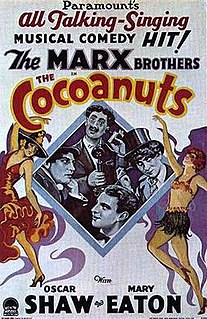 W
WThe Cocoanuts is a 1929 pre-Code musical comedy film starring the Marx Brothers. Produced for Paramount Pictures by Walter Wanger, who is not credited, the film also stars Mary Eaton, Oscar Shaw, Margaret Dumont and Kay Francis. It was the first sound film to credit more than one director, and was adapted to the screen by Morrie Ryskind from the George S. Kaufman Broadway musical play. Five of the film's tunes were composed by Irving Berlin, including "When My Dreams Come True", sung by Oscar Shaw and Mary Eaton.
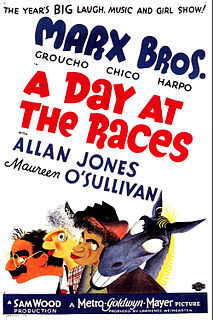 W
WA Day at the Races (1937) is the seventh film starring the Marx Brothers, with Allan Jones, Maureen O'Sullivan and Margaret Dumont. Like their previous Metro-Goldwyn-Mayer feature A Night at the Opera, this film was a major hit.
 W
WDuck Soup is a 1933 comedy film written by Bert Kalmar and Harry Ruby, with additional dialogue by Arthur Sheekman and Nat Perrin, directed by Leo McCarey. Released theatrically by Paramount Pictures on November 17, 1933, it starred the Marx Brothers and also featured Margaret Dumont, Louis Calhern, Raquel Torres and Edgar Kennedy. It was the last Marx Brothers film to feature Zeppo and the last of five Marx Brothers movies released by Paramount Pictures. Groucho plays the newly installed president of a fictional country, and Zeppo is his secretary, while Harpo and Chico are spies for a rival country's ambassador. Relations between Groucho and the foreign ambassador deteriorate during the film, and they go to war at the conclusion.
 W
WGo West is a 1940 Metro-Goldwyn-Mayer comedy-western film starring the Marx Bros. In their tenth film, Groucho, Harpo, and Chico head to the American West and attempt to unite a couple by ensuring that a stolen property deed is retrieved. The film was directed by Edward Buzzell and written by Irving Brecher, who receives the original screenplay credit.
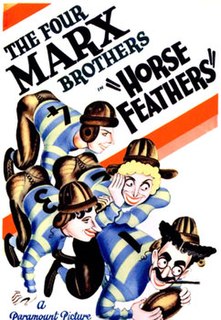 W
WHorse Feathers is a 1932 pre-Code comedy film starring the Marx Brothers. It stars the Marx Brothers, Thelma Todd and David Landau. It was written by Bert Kalmar, Harry Ruby, S. J. Perelman, and Will B. Johnstone. Kalmar and Ruby also wrote the original songs for the film. Several of the film's gags were taken from the Marx Brothers' stage comedy from the 1900s, Fun in Hi Skule. The term "horse feathers" was a colloquial American expression for "nonsense" in the 1920s and 1930s but is now archaic.
 W
WHumor Risk, also known as Humorisk, is a lost unreleased 1921 silent comedy short film that was the first film to star the Marx Brothers. The print may have been accidentally thrown away when left in the screening box overnight. Another version of the story says that Groucho Marx, unhappy with the film's quality, intentionally burned the negative after a particularly bad premiere screening.
 W
W"The Incredible Jewel Robbery" was an episode of General Electric Theater, broadcast by CBS on March 8, 1959. It was the first appearance of the three Marx Brothers together in the same scene since A Night in Casablanca in 1946, although they had appeared in individual scenes in The Story of Mankind in 1957, and in pairs in Love Happy in 1949. "Jewel Robbery" would be their last joint TV appearance.
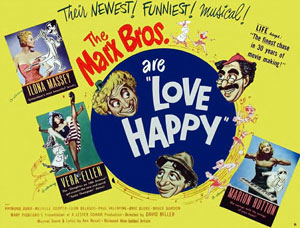 W
WLove Happy is a 1949 American musical comedy film, released by United Artists, directed by David Miller and starring the Marx Brothers in their 13th and final feature film.
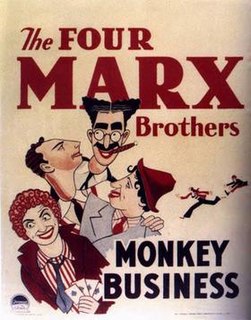 W
WMonkey Business is a 1931 American pre-Code comedy film. It is the third of the Marx Brothers' released movies, and the first with an original screenplay rather than an adaptation of one of their Broadway shows. The film also features Thelma Todd, Harry Woods and Ruth Hall. It is directed by Norman Z. McLeod with screenplay by S. J. Perelman and Will B. Johnstone. Much of the story takes place on an ocean liner crossing the Atlantic Ocean.
 W
WA Night at the Opera is a 1935 American comedy film starring the Marx Brothers, and featuring Kitty Carlisle, Allan Jones, Margaret Dumont, Sig Ruman, and Walter Woolf King. It was the first of five films the Marx Brothers made under contract for Metro-Goldwyn-Mayer after their departure from Paramount Pictures, and the first after Zeppo left the act. The film was written by George S. Kaufman and Morrie Ryskind from a story by James Kevin McGuinness, with additional uncredited dialogue by Al Boasberg. The film was directed by Sam Wood.
 W
WA Night in Casablanca is a 1946 film starring the Marx Brothers: Groucho, Chico, and Harpo. The picture was directed by Archie Mayo, and written by Joseph Fields and Roland Kibbee.
 W
WDuck Soup is a 1933 comedy film written by Bert Kalmar and Harry Ruby, with additional dialogue by Arthur Sheekman and Nat Perrin, directed by Leo McCarey. Released theatrically by Paramount Pictures on November 17, 1933, it starred the Marx Brothers and also featured Margaret Dumont, Louis Calhern, Raquel Torres and Edgar Kennedy. It was the last Marx Brothers film to feature Zeppo and the last of five Marx Brothers movies released by Paramount Pictures. Groucho plays the newly installed president of a fictional country, and Zeppo is his secretary, while Harpo and Chico are spies for a rival country's ambassador. Relations between Groucho and the foreign ambassador deteriorate during the film, and they go to war at the conclusion.
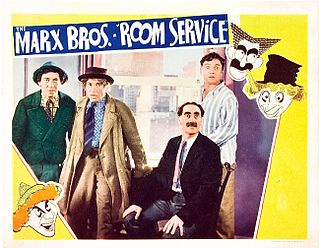 W
WRoom Service is a 1938 RKO film comedy directed by William A. Seiter, based on the 1937 play of the same name by Allen Boretz and John Murray. The film stars the Marx Brothers and also features Lucille Ball, Ann Miller and Frank Albertson.
 W
WThe Story of Mankind is a 1957 American fantasy film, very loosely based on the nonfiction book The Story of Mankind (1921) by Hendrik Willem van Loon. The film was directed and co–produced by Irwin Allen and released by Warner Bros. The all-star cast movie was a critical failure.